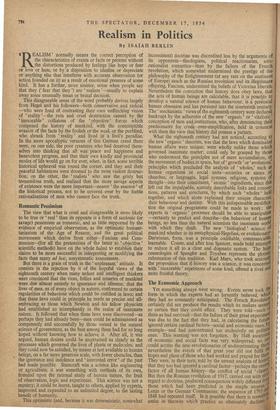inconsistent) doctrine was discredited less by the arguments of its
opponents—theologians, political reactionaries, anti- rationalist romantics—than by the failure of the French revolution, which somewhat undermined the prestige of the philosophy of the Enlightenment (at any rate on the continent of Europe) much as the Russian revolution and its illegitimate offspring, Fascism, undermined the beliefs of Victorian liberals. Nevertheless the conviction that history does obey laws, that the acts of human beings are calculable, that it is possible to develop a natural science of human behaviour, is a perennial human obsession and has persisted into the nineteenth century. The ` mechanistic ' views of the eighteenth century were declared, bankrupt by the adherents of the new organic' or vitalistic conception of men and, institutions, who, after denouncing their predecessors for crude over-simplification, held in common with them the view that history did possess a pattern. , What the eighteenth century had not noticed, according to the new organic ' theorists, was that the laws which dominated human affairs were unique; were wholly unlike those which governed inanimate matter; could only be grasped by those who understood the principles not of mere accumulation, of, the movement of bodies in space, but of ' growth ' or evolution; principles which precluded the analysis of wholes,' such as human organisms or social units—societies or states of churches, or languages, legal systems, religions, systems of thought—into their constituent, atomic' ingredients, since this left out the impalpable, scarcely describable links and connect' tions, patterns and structures, by which such `wholes' held together, and which alone explained their unique character, their behaviour and destiny. With this indispensable modifies' tion the original programme could be made to work : the experts in organic' processes should be able to manipulate —certainly to predict and describe—the behaviour of hunial beings, no less than the natural scientists the inanimate worla, with which they dealt. The new biological ' science 01 mankind whether in its metaphysical-Hegelian, or evolutionarY' Darwinian, form, was a principle codifiable, communicable, learnable. Comte, and after him Spencer, made bold atteniptS to reduce it all to a clear and dogmatic system. The hug cosmologies of Spengler and Toynbee represent the glooraY culmination of this tradition. Karl Marx, who took seriously the proposition that if history was a science, it was concern" with inexorable' repetitions of some kind, offered a rival an more fruitful theory,


































 Previous page
Previous page